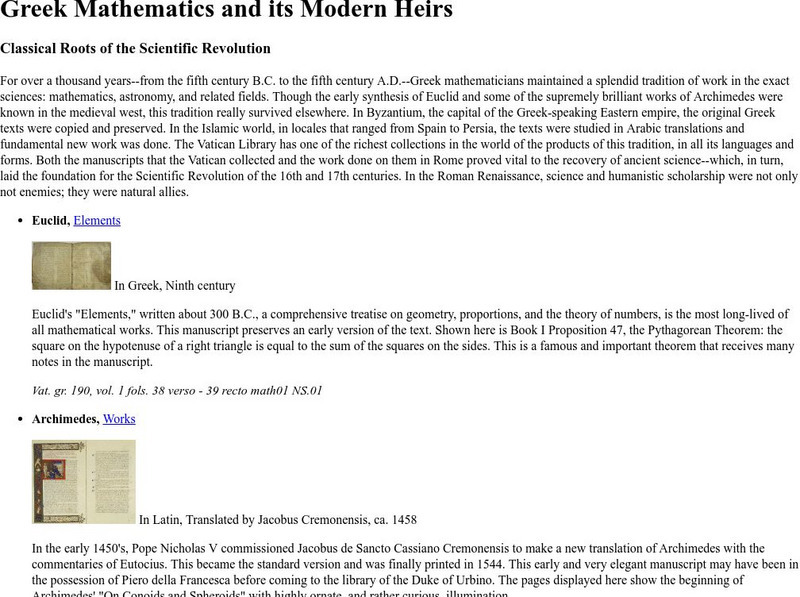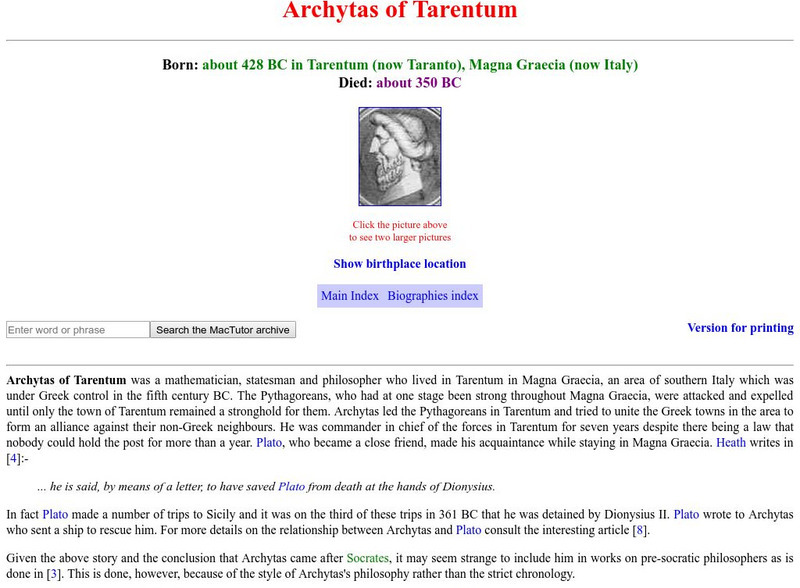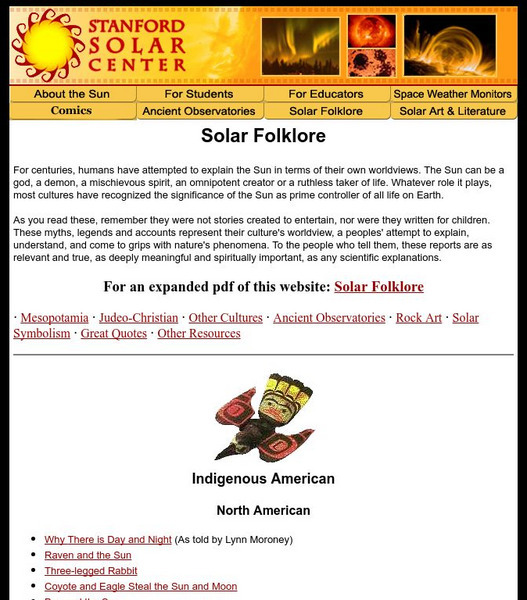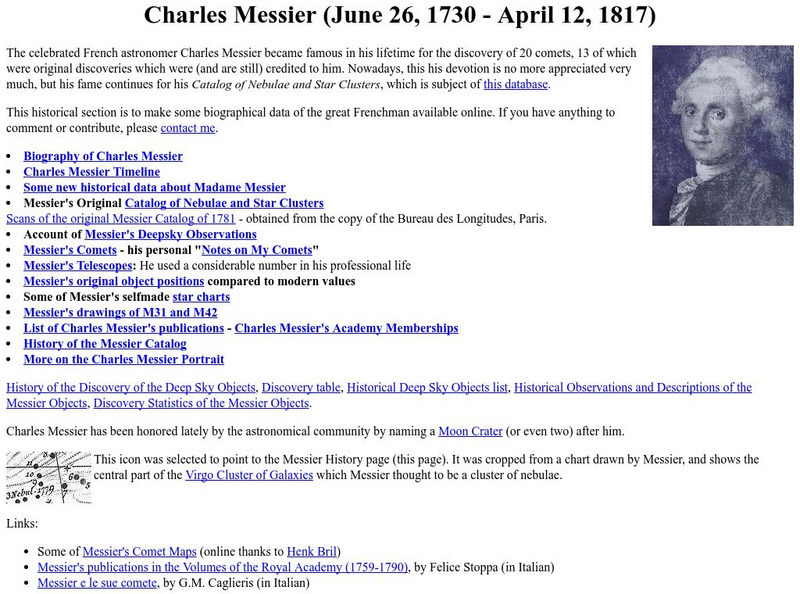ibiblio
Ibiblio: Greek Mathematics and Its Modern Heirs
This ibiblio.org site discusses the "Classical roots of the scientific revolution," with concentration on the Greek mathematicians from the 5th century BC to the 5th century AD who "Maintained a splendid tradition of work in the exact...
Chicago History Museum
Encyclopedia of Chicago: Adler Planetarium
Examine the history of famous Chicago landmark, the Adler Planetarium and Astronomy Museum.
Curated OER
Ancient Greek Philosophy: Thales of Miletus
Includes a short summary of the life and work of the Greek philosopher Thales of Miletus. Discusses his life, work in Astronomy and Mathematics, and view of water and pantheism. Also includes a couple of quotations that make reference to...
University of Oregon
University of Oregon: Greek Science: Early Cosmology
Discusses the evolution of ideas about the cosmos, from the Magic Cosmology of the Neolithic age to the stage of Mythical Cosmology, to the Geometric Cosmology of the ancient Greeks. The third stage advocated a rational approach to...
PBS
Pbs: Discovery of Quasars 1960
PBS offers a brief history of the discovery of quasars and the people involved.
Other
Astrolabe.org: The Astrolabe
A description of the ancient astrolabes and how they worked. Provides information about definitions, collections, and also includes photos.
Other
The Ptolemaic Model of the Planetary System
An easy-to-read description and history of Ptolemy's geocentric model of the universe. Geocentric means that Ptolemy believed the Earth was the center of the universe.
Other
Discover Magazine
Discover Magazine brings you the world of science: the latest research news, enhanced versions of articles, and a full-text archive.
University of St. Andrews (UK)
University of St. Andrews: Archytas of Tarentum
Claiming that "mathematics was composed of four branches, namely geometry, arithmetic, astronomy, and music", Archytas made an impact on Plato and other mathematicians.
Libre Text
Libre Texts: Chemistry: Black Hole Thermodynamics
Why did black holes enter the realm of thermodynamics? This concise article dives into the history.
Other
The Astrolabe: Home Page
This site provides a very general overview of astrolabe principles with links to other pages for more detailed information.
University Corporation for Atmospheric Research
Ucar: High Altitude Observatory: Aristarchus of Samos (310 230 Bc)
A brief biography and discussion of Aristarchus' theories provided here.
Christian Science Monitor
Christian Science Monitor: The Map of the Millennium
This article from the Christian Science Monitor explores the impact of key astronomical discoveries of the past millennium on science and religion.
Other
Teach With Movies: Lesson Plans Based on Shorts and Clips
Links to many video-clip based lessons in the areas of health, English language arts & drama, mathematics, music, biology, earth science, inventions, astronomy, physics, chemistry, U.S. history and culture, and world history and...
Stanford University
Solar Folklore
Folktales from many cultures around the world about the sun. There is also information available about ancient astronomy.
National High Magnetic Field Laboratory
Magnet Academy: John Daniel Kraus
For a man whose career involved the entire known universe, John Kraus had a remarkably insular upbringing. He was born and raised in Ann Arbor, Michigan, and earned his bachelor's, master's and doctoral degrees in physics, all at the...
National High Magnetic Field Laboratory
Magnet Academy: Edward Purcell
Edward Mills Purcell was an American physicist who received half of the 1952 Nobel Prize for Physics for his development of a new method of ascertaining the magnetic properties of atomic nuclei. Known as nuclear magnetic resonance...
University of St. Andrews (UK)
University of St. Andrews: Mayan Mathematics
After a historical introduction, this site from the University of St. Andrews provides information about the mathematics of the Maya Civilization and shows just how advanced they were.
Space Telescope Science Institute
Amazing Space: No Escape: The Truth About Black Holes
This site is for teachers or anyone interested in detailed information on black holes. Lesson plans are included as well as a grab bag of web images. Students have a chance to write and submit a paper on black holes and to explore the...
Other
Seds Usa: Charles Messier
Charles Messier (1730-1817 CE) is credited for discovering 13 comets. He also began the Catalog of Nebulae and Star Clusters. This catalog as well as a great deal of information on Messier is available here. The Messier objects are also...
Other
Native American Indian Art
This site provides illustrations and descriptions of Native American art and painting. Visual sampling of many Native American artists.
Education.com
Education.com: Free Worksheets and Printables for Kids
[Free Registration/Login Required] A large collection of worksheets that are free to download. Choose a grade, subject and topic to see what is available.
Curated OER
University of St. Andrews: Alcuin of York
This site from the University of St. Andrews provides a biography on Alcuin which discusses his development of the Carolingian minuscule, his time as headmaster at Charlemagne's Palace School, and his elementary texts on arithmetic,...
Curated OER
University of St. Andrews: Archytas of Tarentum
Claiming that "mathematics was composed of four branches, namely geometry, arithmetic, astronomy, and music", Archytas made an impact on Plato and other mathematicians.
Other popular searches
- Ancient Astronomy
- Astronomy History
- Astronomy History People
- The History of Astronomy
- Aztec Astronomy History
- Ancient Astronomy Info
- Ancient Greek Astronomy
- Korean History Astronomy





















